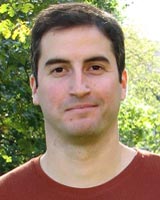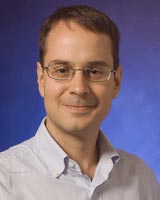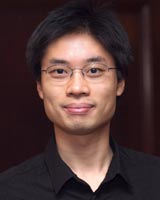2011 Wimmer Faculty Fellows
We are pleased to announce the 2011 Wimmer Faculty Fellows. These fellowships are made possible by a grant from the Wimmer Family Foundation and are designed for junior faculty members interested in enhancing their teaching through concentrated work designing or re-designing a course, innovating new materials, or exploring a new pedagogical approach. Fellows work in close collaboration with Eberly Center teaching consultants and receive a stipend to acknowledge the work it takes to improve one's effectiveness as an educator.
 |
Mike Finegold, Department of Statistics
Mike strives to “use engaging curriculum to get students hooked on statistics with their first course.” He wants students to see that, while getting statistical analysis “right” can have great benefit, getting it “wrong” can have serious consequences. His goals for the Wimmer Program involve developing a set of case studies for his course: Probability and Statistics for Business Applications. We see this as a particularly worthy goal, since well-developed case studies are highly valuable as a pedagogical tool, yet in short supply. Mike will work with the Eberly Center to identify the concepts he wants to highlight, and develop authentic cases that explore these cases in sufficient depth and complexity to promote deep analytical skills. He will also plan strategies to utilize these cases effectively for instruction and assessment.
|
 |
Craig Maloney, Department of Civil and Environmental Engineering
Craig recognizes the need, as an instructor, to “put oneself in the place of the students,” to identify the knowledge and skills students need to connect ideas meaningfully, and to create sufficient structure to allow students to succeed while also providing the freedom to create something original. Craig’s goals for the Wimmer program involve developing modules that introduce students to numerical modeling (an increasingly critical skill in engineering) and integrating these modules effectively into an upper-division undergraduate course. He also hopes to create instructional activities that give students (a) practice interacting effectively with colleagues in other disciplines and (b) presenting their work to non-technical audiences. He will work closely with Eberly colleagues to create these materials and integrate them into a coherent, effective course.
|
 |
Po-Shen Loh, Department of Mathematical Sciences
Po is interested in developing a series of three new courses focused on creative problem solving. The context will be math and the motivation will be preparing students for the nationally renowned William Lowell Putnam Mathematical Competition; however, the courses have far broader application, in that they will help students acquire robust problem-solving skills that are relevant in all disciplines. Po is interested in experimenting with non-traditional instructional styles, including using crowd sourcing and individualized hints. He will work closely with the Eberly Center to scaffold the courses so that students are challenged appropriately and engaged throughout.
|


